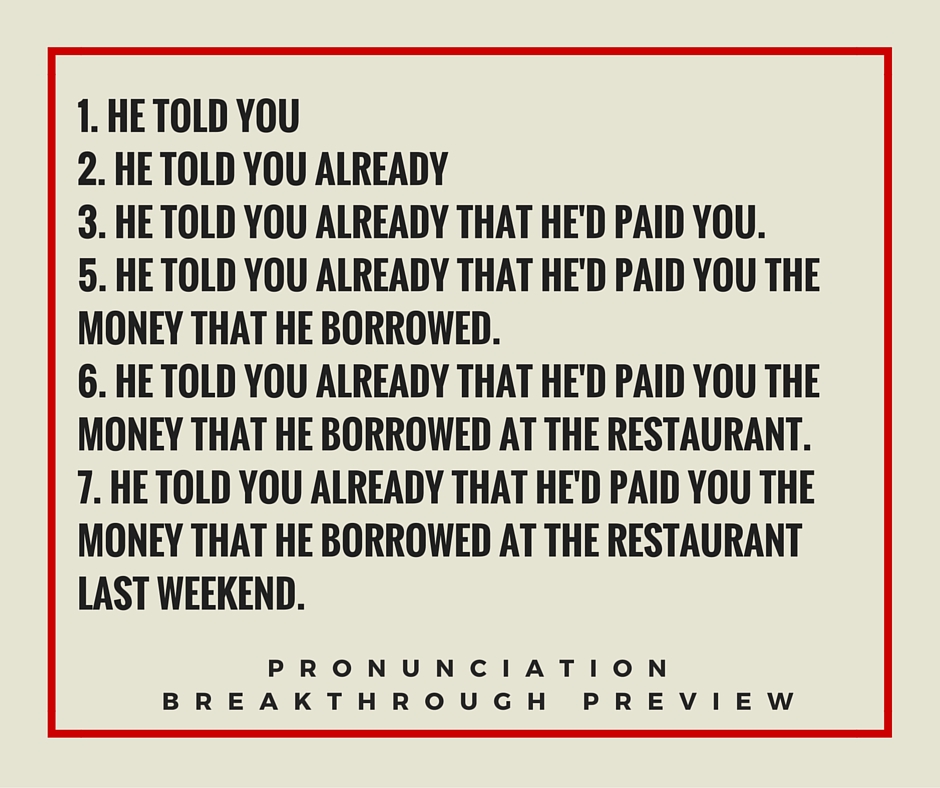
Stress-free Stresses in English Pronunciation
Today I am delighted (*happy*) to share a guest post from the talented pronunciation coach, Elena Mutonono, who also happens to be my co-host for the upcoming Breakthrough Pronunciation Workshop.
Breakthrough Pronunciation is a 3 day workshop designed to help you advance not only in your pronunciation skills, but your careers as well. With guidance from us, 2 experienced online English teachers, you can break current boundaries, and reach new levels of fluency.
*UPDATE: Breakthrough Pronunciation is now closed. If you are interested in more pronunciation training, please click here.*
As for today’s post, Elena will cover a topic that is so important in pronunciational fluency, and a hard skill to master. This skill is English stress.
Take it away Elena…
For some strange reason pronunciation training has a missing link. People spend hours and hours focusing on how to produce certain sounds, but when it comes to word stress some how they are not as important. Stresses are natural and who cares where they are as long as you get it right… most of the time. Well, it turns out stresses can be rather stressful.
A few years ago I heard a story of an English teacher presenting at an International Conference. The teacher was a non-native English speaker, but spoke rather clearly. Well, almost. Except for one word. It was the only word that he mispronounced and that everyone remembered. Why? Because the word was the topic of his presentation.
For about an hour the man talked about voca[BJU:]lary and the importance of building it up daily. He gave several strategies on how vocaBULaries can be improved, boosted and used. He spoke of active and passive vocaBULary. You may be laughing because as a non-native speaker you may have made the same mistake, so no big deal, right?
But for all the native speakers present at the workshop the central message of the presentation remained a mystery. It was all because the speaker put the stress on the wrong syllable and said vocaBULary instead of voCABulary.
The case for stresses in pronunciation training
When I was just beginning to teach pronunciation I realized that I was probably doing something wrong. I would drill my students on how to make the perfect /ð/ sound, but when I asked them to read a short text out loud they stumbled over every single word! All of my work seemed absolutely useless whenever they would start reading paying no attention to pauses, stresses, weak and strong forms. It was a mess!
But that wasn’t the end of it. Whenever they spoke many they would use the same stressful stress pattern where pauses were all over the place, but not where they were supposed to be. That in turn affected their listening comprehension skills. They wouldn’t be able to understand spoken English because the natural English rhythm was different from the pattern that they developed.
How do we learn stresses?
I had to go back and learn from the professors who write pronunciation books why my students weren’t learning these things when they spent so much time drilling how to pronounce perfect consonants and vowels. Based on all the information I pulled from different sources I realized that stresses must be learned as thoroughly as basic English sounds, if not more thoroughly.
Here are 6 things about stresses that will make your English speaking stress-free:
- Stressed syllables and words are different from non-stressed ones. How? They are longer, louder, higher and clearer (*1). Every time you pronounce a stressed syllable remember these 4 criteria.
- Non-stressed words are functional words, like a) prepositions and conjunctions (and, but, on, with, for, etc.), b) articles and particles (a, an, the, to), c) pronouns (I, we, his, them, their, our, etc.), d) auxiliary and modal verbs (in the affirmative form: have, am, is, do, can, should, etc.) (*2). Stressed words are the ones that carry meaning, e.g. house, work, computer, books, etc. Here’s an example (the stressed words are in bold): My mother came from another town to stay with us.
- Non-stressed words stick to the stressed ones. That means there are no pauses between non-stressed and the stressed one. Example: She went/ to the park. (/) is the pause. Lots of students put it after “to” or “the” because it is indeed difficult to pronounce two small words quickly without catching your breath. I’ll share with you how you can work on that in the practical part of the post.
- Stressed words are pronounced in (approximately) the same increments of time. If you ever listened to music (or danced to it) one thing that you really appreciate is the steady beat. It’s like pulse, steady, even, and in a way predictable. The same has to happen when you speak English. When you keep your stressed words spaced out at regular intervals your speech becomes pleasant to hear.
- Stressed words have to be contrasted to the non-stressed ones. The beauty of the English language is in the contrasts. Learn to make stressed words longer, louder, higher and clearer, and non-stressed ones – shorter, quieter and lower. That’s where the contrast comes in.
- Keep the beat. It’s easier to keep the beat in shorter sentences, much more difficult in longer ones. If you practice regularly you will find keeping the beat in 3-4 line sentences much easier than before.
Here’s your practical assignment.
Below is an exercise that will help you with stresses. (*2).
Some guidelines:
Read each line slowly several times, then gradually build you tempo. If it’s hard for you when you try to read faster it means you need to repeat it more slowly again. Use my recording to practice the rhythm after you have read each sentence slowly multiple times.

Listen to the audio by clicking here.
Once you are done reading through them, go ahead and record them and then post your recording in our Pronunciation Breakthrough group on Facebook so we can evaluate and give you some pointers on how to continue working on your pronunciation in the future!
*Marnie Reed and Christina Michaud, “Advanced Pronunciation Topics: Beyond the Basics.” TESOL 2008 Pre-Conference Institute.
ABOUT THE AUTHOR

Elena Mutonono (http://elenamutonono.com/) has been teaching pronunciation for over 12 years. She developed a series of LinkedEnglish pronunciation courses where she focuses on connected speech principles in the English language.
Happy Studying ♥
If you know someone learning English, especially pronunciation, please share this post with them. We thank you, and so will your friends!
xo,
Jennifer
Do you want to speak more natural and fluent English?
JOIN THE CONVERSATION CLUB AND GET WEEKLY SPEAKING PRACTICE & REAL CONVERSATIONS TO IMPROVE YOUR SPEAKING FLUENCY
The Conversation Club will provide you with 6 group conversation calls to practice with a real teacher and a group message community to connect with other members.
You will also get weekly English lessons to help your vocabulary, listening, reading, pronunciation, and more!
Try the Club for 1 week, free! Join the 1-week free trial here.
